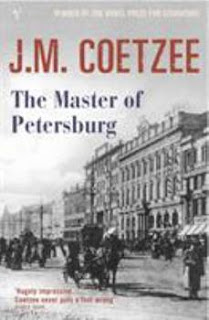Sobriquet 38.24
The following post was originally published on 1/23/08.
I took a break from writing today, largely because I had to wake up early for work and spend the morning and early afternoon on campus before having a chance to sit down and get anything done. In any case, I did read two brief essays on The Master of Petersburg, or, rather, one brief essay and one review. I have been curious to see how critics respond to the novel, especially since the book takes place in nineteenth century tsarist Russia as opposed to, say, a thinly-veiled twentieth century South Africa. I am even more curious to see how they handle the fact that, after Disgrace, Coetzee's fictional characters accompany him to Australia.
As is so often the case, the two critics I encountered today sought to somehow explain how Coetzee's increasingly un-South African settings are, in fact, representations of South Africa. There seems to be a definite tendency among Coetzee scholars to dwell on the specifically South African aspects of the author's fiction while ignoring some very significant universal themes. I am guessing that this is one of the reasons for dearth of articles on The Master of Petersburg.
I suppose that one of the flaws of literary criticism--or, at least, one of the lingering effects of the poststructuralist hyper-politicization of all cultural production--is the reluctance of many critics to shake off the temptation to read politics into a given text. I anticipate the discourse enveloping the The Master of Petersburg to put this surmise to the test and, oddly, I am driven to read critical writing for precisely this reason.
In any case, I read Gary Adelman's "Stalking Stavrogin: J. M. Coetzee's The Master of Petersburg and the Writing of The Possessed" and Bert Beynen's review of the novel and, despite my somewhat jaundiced response to the respective authors' 'South Africanization' of the text, I found both essays to be well-written, thoughtful pieces of criticism. In the former, Adelman argues that "J. M. Coetzee's situation as a South African writer living under a repressive regime must have contributed to the genesis of The Master of Petersburg," while also addressing the far more interesting ways the novel creates a counter-historical narrative to rival 'official' history (351). Additionally, Adelman proceeds with a solid close reading of the text, analyzing the dark, often perverse path the fictionalized Dostoyevsky embarks upon in order to find the inspiration he requires to begin writing The Possessed. Here, as elsewhere in the canon of Coetzee scholarship, the process of writing takes center stage in a discussion of literary authority. The difference, in the criticism surrounding The Master of Petersburg, however, is the increasingly bleak, almost (dare I use a charged word?) evil form the life of a writer can take.
In his review of the novel, Beynen asks "what will [Coetzee] be writing about now that the old South Africa is no more?" (447). Although he opens the review with a brief discussion of the possibility that Coetzee chose to use "Petersburg" (not, Beynen emphasizes, "Saint Petersburg") in the title of the novel to evoke the "conservative" South African town of Pietersburg--thereby drawing parallels between the two societies--Beynen joins Adelman in emphasizing the text's concern with writing fiction. In the end, the reviewer concludes--again, like Adelman--that Coetzee's novel challenges 'official' history (whether it be South African or Russian) by offering a case for the re-creation of reality through the process of fiction-writing.
I also worked on my bibliography, so today was not a waste.
For tomorrow: Try to write a bit more about Age of Iron or, at the very least, read another essay or two.




Comments
Post a Comment